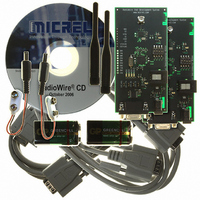MICRF505DEV1 Micrel Inc, MICRF505DEV1 Datasheet - Page 16

MICRF505DEV1
Manufacturer Part Number
MICRF505DEV1
Description
KIT DEV RADIOWIRE 850-950MHZ
Manufacturer
Micrel Inc
Series
RadioWire®r
Type
Transceiver, ISMr
Specifications of MICRF505DEV1
Frequency
850MHz ~ 950MHz
For Use With/related Products
MICRF505
Lead Free Status / RoHS Status
Lead free / RoHS Compliant
Other names
576-1606
Available stocks
Company
Part Number
Manufacturer
Quantity
Price
Company:
Part Number:
MICRF505DEV1
Manufacturer:
Micrel Inc
Quantity:
135
0001001
The lengths of the N, M, and A registers are 12, 12
and 6 respectively The values can be calculated
from the following formula:
where
There are two sets of each of the divide factors (i.e.
A0 and A1). If modulation by using the dividers is
selected (that is Modulation1=1, Modulation0=0), the
two sets should be programmed to give two RF
frequencies, separated by two times the specified
frequency deviation. For all other modulation
methods, and also in receive mode, the 0-set will be
used.
Crystal Oscillator (XCO)
The crystal oscillator is a very critical block. As the
crystal oscillator is a reference for the RF output
frequency and also for the LO frequency in the
receiver, very good phase and frequency stability is
required. The schematic of the crystal oscillator’s
external components for 16MHz are shown in Figure
5.
The crystal should be connected between pins
XTALIN and XTALOUT (pin 23 and 24). In addition,
loading capacitors for the crystal are required. The
loading capacitor values depend on the total load
capacitance, C
capacitance seen between the crystal terminals
should be equal to C
the specified frequency.
Adr
October 2006
D7
‘0’
XTALOUT
f
PhD
Pin 24
f
f
f
f
PhD
XCO
VCO
RF
D6
‘0’
Figure 5. Crystal Oscillator Circuit
: RF carrier frequency
=
: Phase detector comparison frequency
: Crystal oscillator frequency
: Voltage controlled oscillator frequency
D5
‘1’
f
XCO
M
L
, specified for the crystal. The load
XCOtune4 XCOtune3 XCOtune2
D4
=
C10
5.6pF
(
1 ≤ A < N
16
L
for the crystal to oscillate at
f
M ≠ 0
VCO
×
N
D3
+
Y1
TSX-10A
2
A
) (
=
D2
16
C11
5.6pF
×
f
RF
XCOtune1
N
XTALIN
Pin 23
+
D1
A
)
XCOtune0
D0
16
The
capacitance and PCB stray capacitance. Typically,
the total parasitic capacitance is around 6pF. For
instance, for a 9pF load crystal the recommended
values of the external load capacitors are 5.6pF.
It is also possible to tune the crystal oscillator
internally by switching in internal capacitance using
5 tune bits XCOtune4 – XCOtun0. When XCOtune4
– XCOtune0 = 0 no internal capacitors are
connected to the crystal pins. When XCOtune4 –
XCOtune0 = 1 all of the internal capacitors are
connected to the crystal pins. Figure 6 shows the
tuning range for two different capacitor values, 1.5pF
and no capacitors.
The crystal used is a TN4-26011 from Toyocom.
Specification: Package TSX-10A, Nominal frequency
16.000000 MHz, frequency tolerance ±10ppm,
frequency stability ±9ppm, load capacitance 9pF,
pulling sensitivity 15ppm/pF. When the external
capacitors are set to 1.5pF and the XCOtune=16,
the total capacitance will normally be ~9pF.
The start up time is given in Table 7. As can be
seen, more capacitance will slow down the start up
time.
The start-up time of a crystal oscillator is typically
around a millisecond. Therefore, to save current
consumption, the XCO is turned on before any other
circuit block. During start-up the XCO amplitude will
eventually reach a sufficient level to trigger the M-
counter. After counting 2 M-counter output pulses
the rest of the circuit will be turned on. The current
consumption
approximately 280µA.
100,0
-20,0
-40,0
-60,0
80,0
60,0
40,0
20,0
0,0
0
parasitic
C
8
during
L
Figure 6. XCO Tuning
capacitance
=
XCO bitvalue
C
1
10
16
1
+
the
C
1
11
+ C
prestart
24
is
parasitic
+1 408-944-0800
the
M9999-103106
32
period
pin
2x1.5pF
2x0pF
input
is












